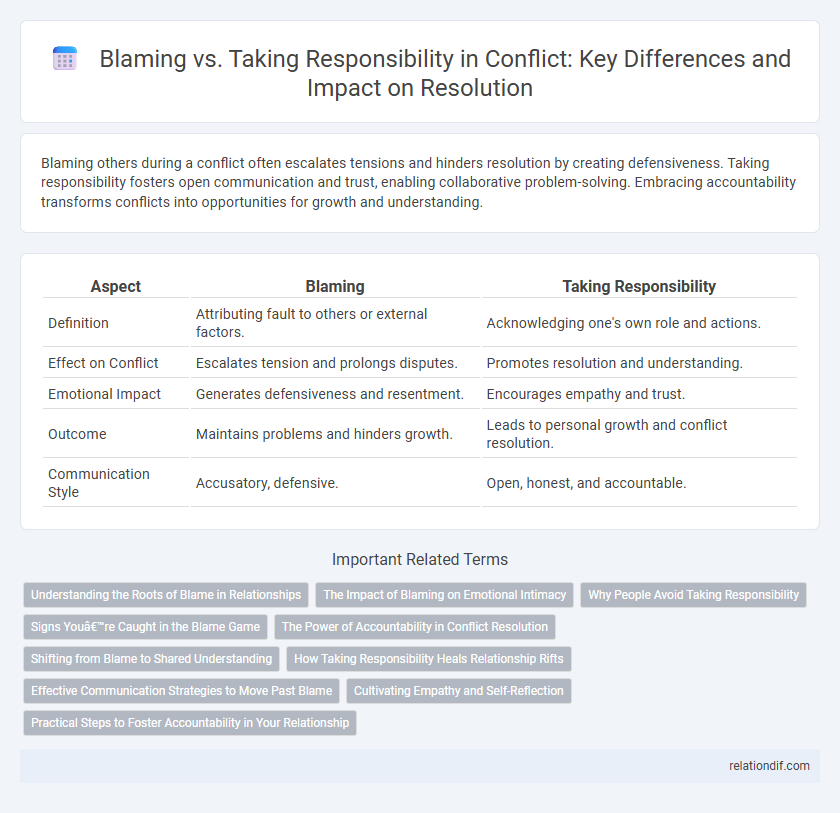Blaming others during a conflict often escalates tensions and hinders resolution by creating defensiveness. Taking responsibility fosters open communication and trust, enabling collaborative problem-solving. Embracing accountability transforms conflicts into opportunities for growth and understanding.
Table of Comparison
| Aspect | Blaming | Taking Responsibility |
|---|---|---|
| Definition | Attributing fault to others or external factors. | Acknowledging one's own role and actions. |
| Effect on Conflict | Escalates tension and prolongs disputes. | Promotes resolution and understanding. |
| Emotional Impact | Generates defensiveness and resentment. | Encourages empathy and trust. |
| Outcome | Maintains problems and hinders growth. | Leads to personal growth and conflict resolution. |
| Communication Style | Accusatory, defensive. | Open, honest, and accountable. |
Understanding the Roots of Blame in Relationships
Blaming in relationships often stems from unresolved fears, insecurities, and unmet needs that distort perception and communication. Taking responsibility requires recognizing these underlying emotions and patterns without defensiveness or projection. Understanding the roots of blame fosters empathy, accountability, and healthier conflict resolution.
The Impact of Blaming on Emotional Intimacy
Blaming erodes emotional intimacy by fostering defensiveness and mistrust between individuals, creating a barrier to open communication and vulnerability. Persistent blame shifts focus away from problem-solving, intensifying resentment and emotional distance within relationships. Taking responsibility encourages empathy, strengthens trust, and nurtures a safe environment where emotional connections can deepen and heal.
Why People Avoid Taking Responsibility
People avoid taking responsibility in conflicts due to fear of judgment, loss of control, or damaging their self-image. Psychological defense mechanisms like denial and projection help deflect blame onto others, reducing personal accountability. This avoidance undermines conflict resolution by preventing honest communication and mutual understanding.
Signs You’re Caught in the Blame Game
Frequent finger-pointing and refusal to acknowledge personal faults indicate you're caught in the blame game. When conversations focus on who's at fault rather than resolving issues, conflicts escalate instead of being resolved. A lack of accountability paired with shifting responsibility often leads to prolonged disputes and damaged relationships.
The Power of Accountability in Conflict Resolution
Taking responsibility in conflict resolution fosters trust and promotes effective communication, enabling parties to move beyond blame and focus on solutions. Accountability encourages self-reflection and ownership of actions, reducing defensiveness and escalating tensions. Embracing this approach transforms conflict into an opportunity for growth and stronger relationships.
Shifting from Blame to Shared Understanding
Shifting from blame to shared understanding in conflict promotes collaborative problem-solving and strengthens relationships by emphasizing common goals over individual fault. Emphasizing empathetic communication encourages parties to express their perspectives without accusation, fostering mutual respect and clarity. This approach reduces defensiveness and creates a foundation for constructive dialogue and effective resolution.
How Taking Responsibility Heals Relationship Rifts
Taking responsibility for actions in a conflict fosters trust and opens communication channels, allowing both parties to move beyond blame and resentment. Acknowledging one's role in the disagreement helps to validate the other person's feelings, creating a foundation for empathy and mutual understanding. This accountability promotes emotional healing and paves the way for rebuilding damaged relationships effectively.
Effective Communication Strategies to Move Past Blame
Fostering effective communication strategies involves shifting the focus from blaming to taking responsibility, which promotes accountability and constructive dialogue. Utilizing active listening, expressing feelings with "I" statements, and seeking common ground helps de-escalate conflict and facilitates mutual understanding. Emphasizing solutions over fault encourages collaboration and strengthens relationships in conflict resolution.
Cultivating Empathy and Self-Reflection
Blaming others in conflict overlooks the importance of cultivating empathy and self-reflection for personal growth and resolution. Developing empathy allows individuals to understand different perspectives, reducing defensiveness and promoting constructive communication. Engaging in self-reflection encourages accountability, leading to healthier conflict outcomes and strengthened relationships.
Practical Steps to Foster Accountability in Your Relationship
Fostering accountability in relationships requires clear communication where both partners openly acknowledge their actions without shifting blame. Establishing regular check-ins creates a safe space for honest discussions, helping to identify issues early and collaboratively find solutions. Practicing empathy and expressing commitment to growth strengthens trust and encourages mutual responsibility for the relationship's well-being.
Blaming vs taking responsibility Infographic

 relationdif.com
relationdif.com